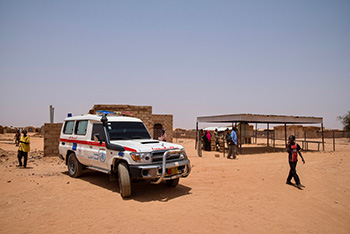 As part of the COVID-19 response, European Civil Protection and Humanitarian Aid Operations (ECHO), is working with WHO to support rapid response teams working for the Ministry of Health in Khartoum. The teams are provided with training, testing kits and PPE, supportive supervision and 14 vehicles to help them respond to alerts quickly. 30 April/2022. Credit: WHO / Lindsay Mackenzie21 July 2022 – Since the first COVID-19 positive case was announced in Sudan on 13 March 2020, the number of confirmed cases and associated deaths had continued to grow beyond the country’s ability to respond. Thanks to the World Health Organization and the European Civil Protection and Humanitarian Aid Operations (ECHO); however, Khartoum State was not only able to navigate the tumult of the COVID-19 pandemic but also respond to other health emergencies, particularly traumatic injuries.
As part of the COVID-19 response, European Civil Protection and Humanitarian Aid Operations (ECHO), is working with WHO to support rapid response teams working for the Ministry of Health in Khartoum. The teams are provided with training, testing kits and PPE, supportive supervision and 14 vehicles to help them respond to alerts quickly. 30 April/2022. Credit: WHO / Lindsay Mackenzie21 July 2022 – Since the first COVID-19 positive case was announced in Sudan on 13 March 2020, the number of confirmed cases and associated deaths had continued to grow beyond the country’s ability to respond. Thanks to the World Health Organization and the European Civil Protection and Humanitarian Aid Operations (ECHO); however, Khartoum State was not only able to navigate the tumult of the COVID-19 pandemic but also respond to other health emergencies, particularly traumatic injuries.
Sudan is one of the countries in the Region most affected by recurring health risks and emergencies. Additionally, the country’s fragile economy, exacerbated by political unrest, only compounds the challenges faced by local health authorities in responding to recurring, and often synchronous, disease outbreaks.
The health scenario reached breaking point at the onset of the COVID-19 pandemic, with the country’s inability to access the homes of suspected COVID-19 cases in Khartoum State’s 3 main localities (Khartoum, Bahri and Omdurman) before 2 – sometimes 3 – days had elapsed, due to lack of vehicles, lack of payment for rapid response teams (RRTs), and lack of personal protective equipment (PPE).
WHO supported with 15 vehicles, payment for rapid response teams, capacity-building, provision of PPE and test kits, as well as technical support on surveillance data management. Seven ambulances equipped with PPE and medical supplies to transport COVID-19 patients from community to primary isolation centers and from hospitals to secondary isolation centres were also donated by WHO.
Accordingly, the response to alerts jumped from 2 to3 days to a maximum of 24 hours.
As for case management, WHO support was enabled by the ECHO project, providing essential medications, intensive care equipment and consumables, and capacity-building for more than 400 clinical staff at isolation centres in 6 of Sudan’s states.
This ambulance system later proved crucial for the transfer of wounded patients associated with the ongoing civil unrest and demonstrations.
Training of ambulance staff on trauma patient care during transfer was carried out in collaboration with Médecins Sans Frontières, along with the provision of trauma-related supplies.
 With support from the European Civil Protection and Humanitarian Aid Operations (ECHO), seven ambulances were provided to health authorities in Khartoum to help with transporting patients to health facilities within localities. 21/04/2022 @WHO / Lindsay MackenzieA referral system based on the donated ambulances was established to transfer wounded patients from first line hospitals to 18 emergency care units in the state with triage maintained at target facilities.
With support from the European Civil Protection and Humanitarian Aid Operations (ECHO), seven ambulances were provided to health authorities in Khartoum to help with transporting patients to health facilities within localities. 21/04/2022 @WHO / Lindsay MackenzieA referral system based on the donated ambulances was established to transfer wounded patients from first line hospitals to 18 emergency care units in the state with triage maintained at target facilities.
The public health care system in Sudan is plagued by limitations in the routine supply of essential medicines and infection prevention and control consumables. During the first COVID-19 wave, services at public health care centres were interrupted due to the reporting of COVID-19 cases among the medical staff, along with a lax attitude by doctors and nurses toward infection prevention measures.
WHO supported by establishing infection prevention and control programmes and assigning focal persons at over 100 public health centres in 7 localities in Khartoum State, thereby helping to maintain operational services and increasing utilization rates.
The targeted health care centres rank highest in terms of utilization and catchment population size in Khartoum State. WHO provided personal protective equipment and IPC supplies to all targeted facilities on a monthly basis, all the while ensuring their rational use with training and supportive supervision to nearly 900 public health care workers.
Additionally, minor rehabilitation for basic infection prevention and control – such as triage area, water supply, waste management and maintenance of latrine service – is ongoing at public health care centres.
The surveillance system established by WHO for health care worker infections with COVID-19, with monthly reporting to both the Ministry of Health and the Organization, successfully reduced the infection rate by 80%.
During subsequent COVID-19 waves, primary health care centre functionality was maintained with no shortages of personal protective equipment reported.


